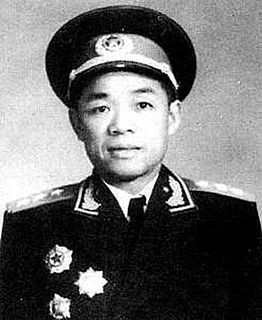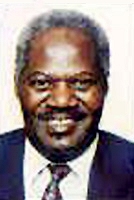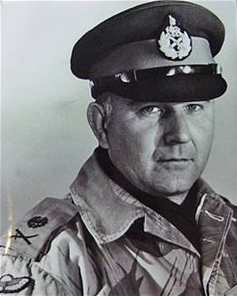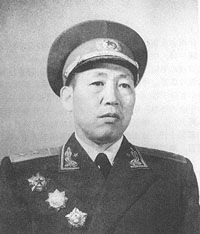External links
| | This Zimbabwean biographical article is a stub. You can help Wikipedia by expanding it. |
| | This biographical article related to an African military person is a stub. You can help Wikipedia by expanding it. |
Gibson Mashingaidze | |
|---|---|
| Born | 1949 Ushe, Bikita District |
| Nationality | Zimbabwean |
Gibson Mashingaidze is a former army general and head of Zimbabwean sports.
He was born in Ushe, Bikita District 2 kilometres (1.2 mi) from Nyika Growth Point in Masvingo province in 1949. He went to Ushe primary school and then to Mashoko Secondary School. He joined the liberation war in the 1970s. He adopted the war name Comrade Tangai (Tangaimaona Povo). He rose through the ranks of ZANLA, a guerrilla movement waging a war against the Ian Smith regime. By the end of the liberation war in 1979 he had risen to become the Political commissar of Manica province (second in command to Gen Paradzai Zimondi who was the provincial commander, known as Comrade Tonderai Nyika at the time).
In 1981 he enrolled in the regular Zimbabwe National Army as a colonel alongside the likes of Chief Air Marshal Perrance Shiri, Air Marshal Henry Muchena, Lt Gen Edzai Chimonyo, Agripa Mutambara (subsequently Zimbabwe's ambassador to Mozambique), Philip Sibanda (Commander of the Zimbabwe Defence Forces) and Paradzai Zimondi (subsequently head of prisons and correction services). He worked in various capacities in the Zimbabwe National Army, including as commander of 4. Brigade in Masvingo province.
In 1996 he was involved in a controversial issue when he lambasted the government for neglecting a war veteran called Comrade Musa Mpofu who had died a pauper despite having been a celebrated guerrilla fighter during the liberation war. It is believed that Mashingaidze was reprimanded by the authorities for his criticism.
He participated in the 27 June 2008 presidential campaign together with Maj Gen Engelbert Rugeje, heading the Masvingo province campaign team. He was put on sanction lists which prevented certain named ZANU-PF personalities from visiting the USA and the European Union.
He was given a farm in Chiredzi under the land reform program. He has retired as a soldier and is now a farmer. He has been appointed to several boards, including The Sports Commission and Zimbabwe Broadcasting Holdings Board.

The Zimbabwe Defence Forces (ZDF) are composed of the Zimbabwe National Army (ZNA) and the Air Force of Zimbabwe (AFZ). As a landlocked country, Zimbabwe has no navy. The most senior commander of the ZDF is General Philip Valerio Sibanda. At the time of independence after the Rhodesian Bush War, the then Prime Minister Robert Mugabe declared that integrating Zimbabwe's three armed forces would be one of Zimbabwe's top priorities. The existing Rhodesian Army was combined with the two guerrilla armies; the 20,000-strong Zimbabwe African National Liberation Army (ZANLA) forces of Zimbabwe African National Union-PF and the 15,000-strong Zimbabwe People's Revolutionary Army (ZIPRA) forces of PF-Zimbabwe African People's Union. The current manpower stands at an estimated strength of 29,000 in the Army, and an estimated 4,000 in the Air Force. Since the Rhodesian Bush War, the armed forces has been mostly involved with the suppression of non-state armed cells in a number of operations.

The Zimbabwe African People's Union (ZAPU) is a Zimbabwean political party. It is a militant organization and political party that campaigned for majority rule in Rhodesia, from its founding in 1961 until 1980. In 1987, it merged with the Zimbabwe African National Union-Patriotic Front. It was relaunched in 2008.

Masvingo is a province in southeastern Zimbabwe. It has a population of 1.485 million as of the 2012 census, ranking fifth out of Zimbabwe's ten provinces. Established as Victoria Province by the British South Africa Company, it was one of the five original provinces of Southern Rhodesia. In 1982, two years after Zimbabwean independence, it was renamed Masvingo Province. The province is divided into seven districts, including Masvingo District, which contains the provincial capital Masvingo City.

The Rhodesian Bush War—also called the Second Chimurenga as well as the Zimbabwe War of Liberation—was a civil conflict from July 1964 to December 1979 in the unrecognised country of Rhodesia . The conflict pitted three forces against one another: the Rhodesian white minority-led government of Ian Smith ; the Zimbabwe African National Liberation Army, the military wing of Robert Mugabe's Zimbabwe African National Union; and the Zimbabwe People's Revolutionary Army of Joshua Nkomo's Zimbabwe African People's Union.

Field Marshal is a five–star general officer rank and the highest attainable rank in the Indian Army. Field Marshal is ranked immediately above general, but not exercised in the regular army structure. It is a largely ceremonial or wartime rank, having been awarded only twice. A field marshal's insignia consists of the national emblem over a crossed baton and sabre in a lotus blossom wreath.

The Zimbabwe National Army (ZNA) is the primary branch of the Zimbabwe Defence Forces responsible for land-oriented military operations. It is the largest service branch under the Zimbabwean Joint Operations Command (JOC). The modern army has its roots in the Rhodesian Army, which was raised between 1963 and 1964 after the breakup of the Federation of Rhodesia and Nyasaland. A Joint High Command created in March 1980 to oversee integration of the formerly belligerent Rhodesian Security Forces, Zimbabwe African National Liberation Army (ZANLA), and the Zimbabwe People's Revolutionary Army (ZIPRA) officially established the Zimbabwe National Army in late 1980, nearly a year after the end of the Rhodesian Bush War.

Johannes "Joe" Modise was a South African political figure. He helped to found Umkhonto we Sizwe, the military wing of the African National Congress, and was its longest serving Commander in Chief, deputised at different points in time by Joe Slovo and Chris Hani. Modise headed MK for a 25-year period, from 1965 to 1990. He served as South Africa's first black Minister of Defence from 1994 to 1999 and led the formation of the post-independence defence force.

Han Xianchu was a general of the Chinese Communist Party. Han participated in many military campaigns and battles such as Battle of Pingxingguan, Liaoshen Campaign, Pingjin Campaign, Hainan Campaign, and the Korean War. In 1955 he was among the first group of military leaders to be awarded the Shang Jiang rank.

The Allied leaders of World War II listed below comprise the important political and military figures who fought for or supported the Allies during World War II. Engaged in total war, they had to adapt to new types of modern warfare, on the military, psychological and economic fronts.

Air Chief Marshal Josiah Tungamirai, born Thomas Mberikwazvo, was a Zimbabwean military officer and politician. He was commander of the Air Force and later served as Minister of State for Indigenization and Empowerment in President Robert Mugabe's government before his death in 2005.

Lieutenant General George Peter Walls GLM DCD MBE was a Rhodesian soldier. He served as the Head of the Armed Forces of Rhodesia during the Rhodesian Bush War from 1977 until his exile from the country in 1980.
The Zimbabwean government claimed to have foiled an alleged coup d'état attempt involving almost 400 soldiers and high-ranking members of the military that would have occurred on June 2 or June 15, 2007. The alleged leaders of the coup, all of whom were arrested, were retired army Captain Albert Matapo, Colonel Ben Ncube, Major General Engelbert Rugeje, and Air Vice Marshal Elson Moyo.
The Joint Operations Command (JOC) is the supreme organ for the coordination of state security in Zimbabwe. It was established by the Rhodesian Security Forces to supervise its counter-insurgency campaign in the Rhodesian Bush War as well as external incursions into neighbouring countries such as Zambia and Mozambique. The JOC retained its role in the post-independence Zimbabwe Defence Forces, and has since been accused of manipulating elections and orchestrating political violence.

Constantine Chiwenga, is a Zimbabwean politician and former army general currently serving, since 2017, as the First Vice-President of Zimbabwe under President Emmerson Mnangagwa. In August 2020, he added the Heath Ministry to his portfolio.
Philip Valerio Sibanda is a decorated Zimbabwean general who has served as commander of the Zimbabwe Defence Forces since December 2017. He was promoted from lieutenant general to full general at that time. As lieutenant general he had served as commander of the Zimbabwe National Army.
Dunn Mabika Hove, also known as Paris Checherere was a Zimbabwean military intelligence officer who was one of the leaders of ZANLA, Robert Mugabe's guerrilla forces during the Rhodesian Bush War. A career soldier, in post-independence Zimbabwe, he went on to have a successful career in the Zimbabwe National Army, serving with distinction in UN and AU led peace keeping missions across Africa.
The 1981 Entumbane uprising, also known as the Battle of Bulawayo or Entumbane II, occurred between 8 and 12 February 1981 in and around Bulawayo, Zimbabwe amid political tensions in the newly independent state. Zimbabwe People's Revolutionary Army (ZIPRA) guerrillas, mainly in the city's western suburb of Entumbane, rebelled, creating a situation that threatened to develop into a fresh civil war, barely a year after the end of the Bush War. The Rhodesian African Rifles (RAR) and other white-commanded elements of the former Rhodesian Security Forces, fighting for the Zimbabwean government as part of the new Zimbabwe National Army, put down the uprising. Groups of Zimbabwe African National Liberation Army (ZANLA) fighters attacked both ZIPRA and the government forces during the revolt, which followed a smaller outbreak of fighting between guerrillas in November 1980.

Wang Bingzhang was a Chinese Communist revolutionary and a founding lieutenant general of the People's Liberation Army (PLA). He joined the Northwest Army of the warlord Feng Yuxiang in 1929, before participating in the Ningdu uprising and defecting to the Communist Red Army in 1931. He fought in the Red Army's Long March, the Second Sino-Japanese War where he was credited with devising a trench warfare tactic that helped destroy enemy pillboxes, and the Chinese Civil War.
The Commander of the Zimbabwe Defence Forces is Chief of the Zimbabwe Defence Forces and the national defence organisations.
Paradzai Willings Zimondi was a hero of the Zimbabwean struggle for independence, and he later attained the rank of major general in the Zimbabwean army. After his military retirement, he served for twenty-two years as the Prisons and Corrections Services Commissioner-General for Zimbabwe.